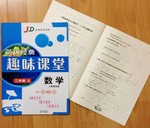题目内容
To be a good teacher, you need some of the gifts of a good actor; you must be able to hold the attention and interest of your students, you must be ? 36 ?—speaking, with a good, strong,? 37 ? voice which is fully under your control; and you must be able to ? 38 ? what you are teaching, in order to make its meaning clear.
? 39 ? a good teacher, and you will see that he does not sit still before his class; he ? 40 ? the whole time he is teaching; he walks about, using his ? 41 ?,hands and fingers to help him in his explanations, and his face to express his ? 42 ?.Listen to him, and you will ? 43 ? the loudness, the quality and the musical note of his voice always ? 44 ? according to what he is talking about. The fact that a good teacher has some of the gifts of a good actor doesn't ? 45 that he will indeed be able to act well on the stage, for there are very important ? 46 ? between the teacher's work and the actor's. The ? 47 ? has to speak words which he has learnt by heart; he has to repeat exactly the ? 48 ? words each time he plays a certain part, even his movements and the ways in which he uses his voice are usually ? 49 ? beforehand. What he has to do is to make all these carefully learnt words and actions seem ? 50 ? on the stage.?
A good teacher ? 51 ? in quite a different way. His students take an active part in his ? 52 ?:they ask and answer questions, they obey orders, and if they don't ? 53 ? something, they will say no. The teacher therefore has to suit his act to the needs of his students, which is in his class. He cannot learn his part by heart, but must ? 54 ? it as he goes along.
I have known many teachers who were fine ? 55 ? in class but unable to take part in a stage play because their brains wouldn't keep discipline: they could not keep strictly to what another had written.
36. A. clear B. slow C. small D. low ?
37. A. frightening B. fearing C. exciting D. pleasing ?
38. A. act out B. talk C. say D. repeat ?
39. A. Listen B. Look C. Watch D. Learn ?
40. A. stands B. sits C. lies D. talks ?
41 A. tongue B. words C. legs D. arms?
42. A. attention B. thanks C. feelings D. sentences ?
43. A. hear B. see C. think D. guess ?
44. A. making B. changing C. expressing D. giving ?
45. A. tell B. express C. show D. mean ?
46. A. things B. differences C. points D. jobs
47. A. actor B. teacher C. boy D. student ?
48. A. different B. same C. above D. following ?
49. A. read B. known C. fixed D. written ?
50. A. natural B. bad C. false D. clear ?
51. A. is B. works C. has D. teaches ?
52. A. group B. party C. class D. play ?
53. A. give B. place C. obey D. hear ?
54. A. invent B. discover C. teach D. continue ?
55. A. learners B. watchers C. actors D. listeners
36-55 ADACA DCABD BABCA BCCAC
解析:
36.A 一个好教师首先要口齿清晰。B项意义不符,用C、D两项修饰speaking 讲不通。
37.D clear, good, strong和pleasing都是用来说明一位优秀的教师必备的条件。pleasing voice是“悦耳的声音”,教师讲课要让学生听起来舒服,故用exciting(激动的)不妥。?
38.A 为了使意义表达得更清楚,教师必须能够把所教的东西表演出来(act out)。?
39.C 观察一位优秀教师上课,你会发现他不是一动不动地坐在全班学生面前。首先,教师讲课的姿态是观察(watch)才知道的;其次,从词性上看,listen, look一般不能直接带宾语;learn语意不对。?
40.A 用stand和前面的sit相对应。?
41.D arms, hands和fingers属于同一范畴。教师通常用手、臂和指头作手势来辅助教学。
42.C 在整个教学过程中,教师除了用手势,还通过面部表情来表达自己的思想感情。?
43.A 听,你就会听见……?
44.B 听他讲课,你会听到他那抑扬顿挫、悦耳动听的声音总是随着他所讲的内容变化而变化。
45.D mean意思是“意味着”。?
46.B 在课堂上有表演天赋的好教师,并不意味着在舞台上就是想当然的好演员,因为教师的工作和演员的工作有着重要的区别。?
50.A 这里具体讲述演员工作和教师工作的区别:演员必须背台词,每次他扮演某个角色时,他都得准确地重复同样的台词,甚至是他的舞台动作和说话方式都是事先固定下来的,他需要做的就是使这些认真背下来的台词在舞台上表演得自然流畅。?
51.B 一位优秀教师的工作则完全不同。这里是把教师和演员相比,故用works。如果选D项,用teaches,则是好教师和非好教师相比,意思为:“好教师的教学方法与其他教师的教学方法不同。”
52.C 学生们以积极的态度听老师的课,他们提问、回答问题。这些活动当然应该是在课堂上。
53.C 前面已有提示词obey。?
54.A 教师不可能把自己所教的内容都背下来,他必须创造性地教学。这里进一步阐明演员的工作是事先设计好的,而教师的工作要随着情境变化的,要具有创造性。?
55.C 许多教师在课堂上表演得很出色,但却不能参加舞台上的演出。

 黄冈经典趣味课堂系列答案
黄冈经典趣味课堂系列答案 启东小题作业本系列答案
启东小题作业本系列答案